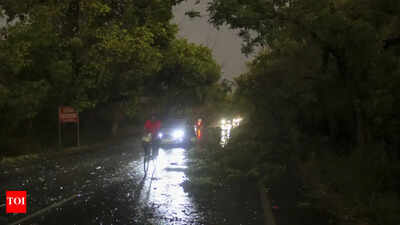Delhi NCR Drives Climate Tech Startup Boom Amidst Crisis
Delhi NCR, a region struggling with pollution, heatwaves, and environmental degradation, is paradoxically fostering a new wave of climate tech startups. These innovative companies are developing homegrown solutions to complex environmental challenges.

Varaha, founded in 2022, is one such startup. Google partnered with Varaha to purchase 100,000 tonnes of carbon dioxide removal credits by 2030 through its biochar projects. Varaha empowers smallholder farmers to adopt sustainable practices like regenerative agriculture and afforestation. The company has onboarded over 100,000 farmers, aiming to curb stubble burning by converting crop residues into biochar.
“Our approach is science and tech-first,” says Madhur Jain, Varaha’s cofounder and CEO. “We use AI, remote sensing, and biogeochemical modeling to monitor and verify carbon removals effectively.”
Dharaksha Ecosolutions, founded in 2020, is another example. Based in Faridabad, it replaces Styrofoam packaging with biodegradable alternatives made from paddy straw waste. “Our product decomposes in 60 days but outperforms thermocol in all aspects,” says Arpit Dhupar, CEO.
FarMart, a Gurugram-based agritech startup, connects over 3.5 million farmers via a digital supply platform. By reducing inefficiencies in transport and storage, FarMart cuts carbon emissions and food waste. “Our logistics model emits 33% less carbon per tonne than conventional systems,” says Alekh Sanghera, co-founder and CEO.
Eeki Foods uses aeroponic farming, allowing year-round vegetable farming with 80% less water and no soil. “Our tech reduces the carbon footprint of vegetables consumed in NCR by cutting down transport and chemical inputs,” says Abhay Singh, co-founder.
Green Aero Propulsion is developing green hydrogen-based propulsion systems for aviation and shipping. The venture was recently recognized at Startup Mahakumbh in Delhi.
These startups chose Delhi NCR for its proximity to policymakers, investors, and talent. The region offers logistical advantages, including access to agricultural states and India’s largest consumer base.
“NCR is not just where the problems are – it’s also where solutions can scale fastest,” says Jain. Sanghera adds, “Being in Gurugram gave us access to north India’s food belts and top tech talent.”
In a city battling climate chaos, this new generation of founders may be its best hope for a cleaner, more resilient future.


